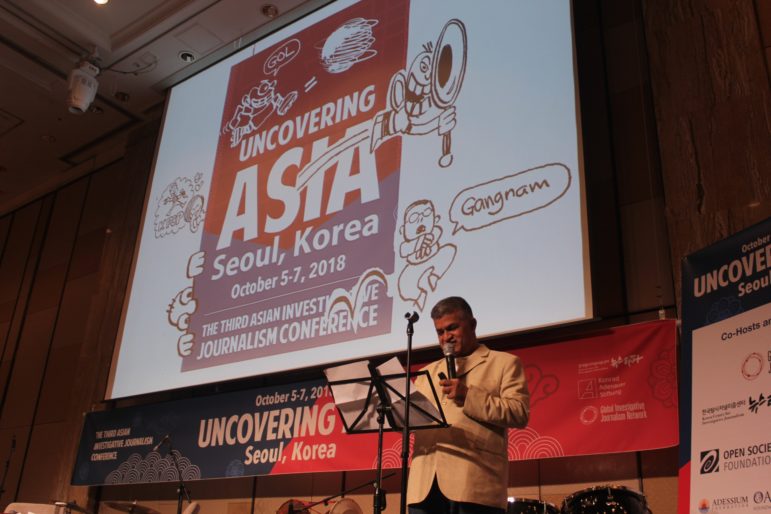
Center Stage: Malaysian cartoonist Zunar, who fights corruption through satirical cartoons, gave a humorous and inspiring keynote address at the Uncovering Asia Conference. Photo: Alexandra Jegers / Finja Seroka
“Everytime you face a challenge, or a risk, keep being positive and you can win one day,” Malaysian cartoonist Zulkiflee Anwar Ulhaque, aka Zunar, offered his words of wisdom to a 400-strong crowd of journalists during his keynote at the Uncovering Asia Conference.
The award-winning cartoonist, who suffered years of persecution under the former Malaysian prime minister Najib Razak’s regime, shares many parallels with investigative journalists. Like journalists, he speaks truth to power, questions authorities’ misdeeds, and exposes excesses and corruption, albeit through a different medium.
He has also lived through many of the threats that investigative journalists face today: arrests, travel bans and sedition charges. However, Zunar has remained optimistic in spite of all these challenges and offered a personal example of staying positive while under attack.
“The police informed me that they bugged my phone, I said thank you very much, everyday I can say four-letter word to the police,” he joked. “For me, if you cannot beat them, laugh at them. No dictator in the world can stand it if you keep laughing at them…until one day they introduce an anti-laughter law,” he added, drawing laughter from the crowd.
And Zunar certainly seems to be having the last laugh now.
While Razak was in power, Zunar was arrested at least five times and banned from leaving the country because the government deemed his cartoons to be “detrimental to public order.” But now the political tide has turned, and Razak, the infamous kleptocrat, has been voted out of power, prohibited from traveling overseas and facing the possibility of imprisonment.
Sheila Coronel, academic dean of the Graduate School of Journalism at Columbia University, said one of the problems with investigative journalism is that journalists write long, complicated pieces that sometimes do not resonate with the people, and she asked Zunar to share his secret to engaging the public.
His answer was simple: “Draw corruption from the perspective of the people.”
“I changed from political cartoons to cartoons for the people,” he said. “I also removed the copyright of my cartoons and told people to go ahead and use it because I say ‘this is your cartoon.’ My talent is not a gift, it is my responsibility. It is my duty as a cartoonist and (yours as) journalists to expose corruption.”
The free access to his cartoons, Zunar believes, was key to growing his support base. And the public’s backing is the one thing that gives him strength to keep fighting the injustices of the authorities curbing his civil rights.
“I want to quote Liverpool’s motto: You’ll never walk alone. I get support from the people,” he said, adding that cartoonists and journalists alike, in “jail-friendly jobs,” have to take a stand and do what we do best when faced with corrupt dictators.
“By being neutral, you are giving mandate to the crooks to rule you even more,” he said. “I am a cartoonist, I draw cartoons. You are journalists, you write. Freedom of expression is our fundamental right, no government will give it to you (freely), so we need to keep fighting.”
 Eunice Au is program coordinator with the Global Investigative Journalism Network. She was previously Malaysia correspondent for Singapore’s The Straits Times and a general beat reporter for Malaysia’s New Straits Times.
Eunice Au is program coordinator with the Global Investigative Journalism Network. She was previously Malaysia correspondent for Singapore’s The Straits Times and a general beat reporter for Malaysia’s New Straits Times.
